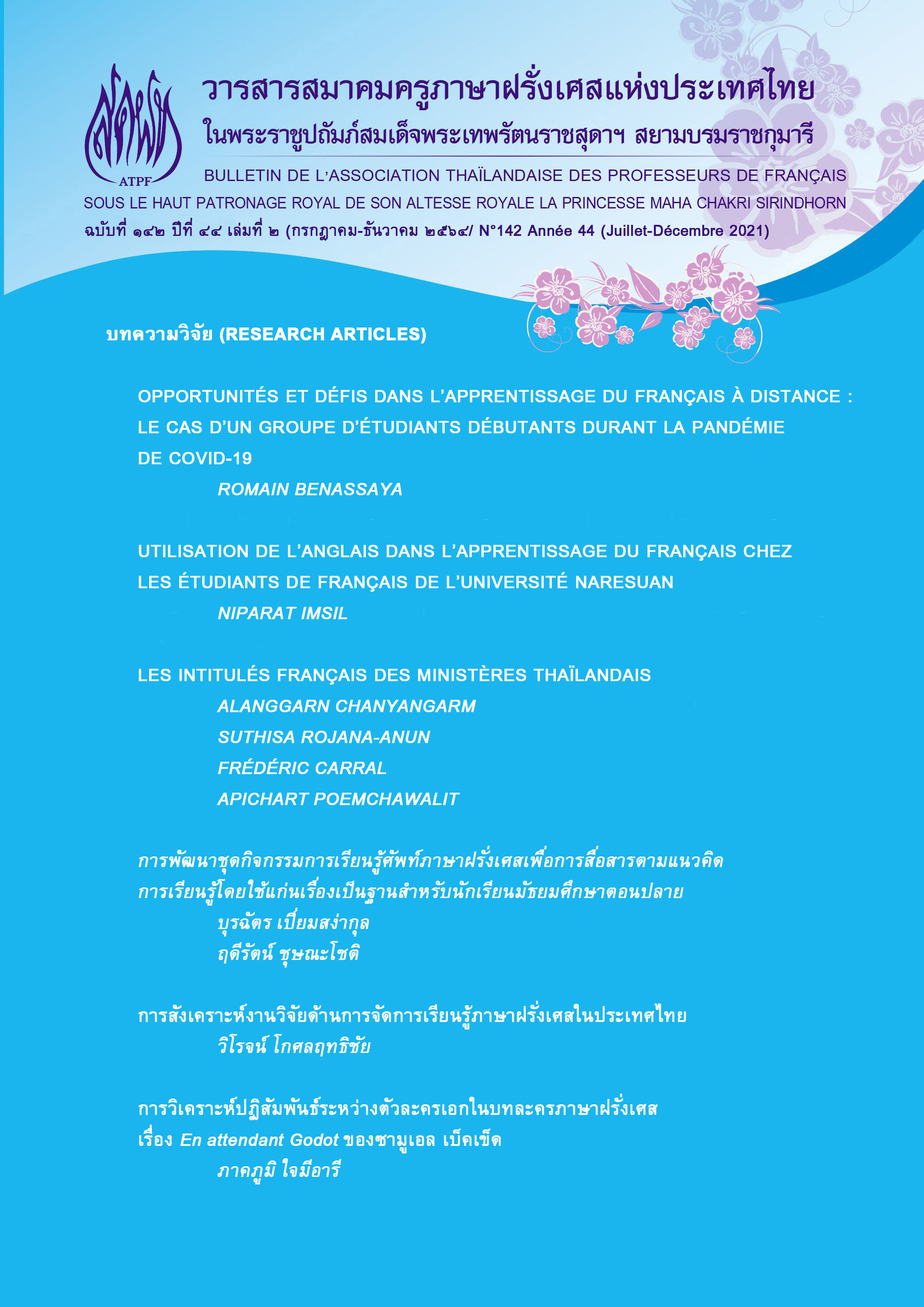การพัฒนาชุดกิจกรรมการเรียนรู้ศัพท์ภาษาฝรั่งเศสเพื่อการสื่อสารตามแนวคิดการเรียนรู้โดยใช้แก่นเรื่องเป็นฐานสำหรับนักเรียนมัธยมศึกษาตอนปลาย
Main Article Content
บทคัดย่อ
การวิจัยครั้งนี้มีวัตถุประสงค์ 1) เพื่อพัฒนาชุดกิจกรรมการเรียนรู้ศัพท์ภาษาฝรั่งเศสเพื่อการสื่อสารตามแนวคิดการเรียนรู้โดยใช้แก่นเรื่องเป็นฐาน 2) เพื่อเปรียบเทียบความรู้ทางศัพท์ภาษาฝรั่งเศสของนักเรียนก่อนและหลังเรียนด้วยชุดกิจกรรมการเรียนรู้ศัพท์ภาษาฝรั่งเศสเพื่อการสื่อสารที่พัฒนาขึ้น กลุ่มตัวอย่างที่ใช้ในการวิจัยคือ นักเรียนชั้นมัธยมศึกษาปีที่ 5 แผนการเรียนภาษาฝรั่งเศสของโรงเรียนรัฐบาลแห่งหนึ่ง สังกัดสำนักงานเขตการศึกษามัธยมศึกษาเขต 2 (กรุงเทพมหานคร) เครื่องมือที่ใช้ในการวิจัยคือ1) แบบทดสอบความรู้ทางศัพท์ภาษาฝรั่งเศส 2)ชุดกิจกรรมการเรียนรู้ศัพท์ภาษาฝรั่งเศสเพื่อการสื่อสารตามแนวคิดการเรียนรู้โดยใช้แก่นเรื่องเป็นฐาน วิเคราะห์ข้อมูลโดยใช้ค่าร้อยละ ค่าเฉลี่ยเลขคณิต ส่วนเบี่ยงเบน มาตรฐาน และสถิติทดสอบค่าเฉลี่ย t-test for dependent sample ที่ระดับนัยสำคัญ .05 ผลการวิจัยสรุปได้ดังนี้ 1) ชุดกิจกรรมการเรียนรู้ศัพท์ภาษาฝรั่งเศสเพื่อการสื่อสารตามแนวคิดการเรียนรู้โดยใช้แก่นเรื่องเป็นฐานที่พัฒนาขึ้นมีทั้งหมด 10 ชุดกิจกรรม โดยในแต่ละชุดกิจกรรมประกอบด้วยคู่มือครู ชุดกิจกรรมที่นักเรียนต้องปฏิบัติ แผนการจัดการเรียนรู้ สื่อการเรียนรู้ แบบฝึกหัด และแบบประเมินผล 2) ความรู้ทางศัพท์ภาษาฝรั่งเศสหลังการทดลองของนักเรียนกลุ่มตัวอย่างในภาพรวมสูงกว่าก่อนการทดลองอย่างมีนัยสำคัญทางสถิติที่ระดับ .05
Downloads
Article Details
เอกสารอ้างอิง
เกศินี ชัยศรี. (2552). สภาพการณ์การเรียนการสอนภาษาฝรั่งเศสในปัจจุบันและปัญหา การเรียนการสอนภาษาฝรั่งเศสของโรงเรียนมัธยมศึกษาในบริบทจังหวัดภูเก็ต. (รายงานการวิจัย). ภูเก็ต: มหาวิทยาลัยสงขลานครินทร์.
พงศธร มหาวิจิตร. (2558). Theme-based Unit: ความท้าทายในการออกแบบการเรียนรู้ สำหรับครูยุคใหม่. วารสารศึกษาศาสตร์ปริทัศน์, 30(2), 93-101.
สถาบันภาษาอังกฤษ สำนักงานคณะกรรมการการศึกษาขั้นพื้นฐาน กระทรวงศึกษาธิการ. (2558). คู่มือการจัดการเรียนการสอน ภาษาอังกฤษแนวใหม่ ตามกรอบ มาตรฐานความสามารถทางภาษาอังกฤษที่เป็นสากล The Common European Framework of Reference for Language (CEFR) ระดับชั้นมัธยมศึกษา. กรุงเทพฯ: องค์การสงเคราะห์ทหารผ่านศึก. .
สุพัตรา วชิระเจริญวงศ์. (2561). การใช้วิธีการสอนคำศัพท์แบบผสมผสานเพื่อพัฒนา ความสามารถด้านคำศัพท์. วารสารมหาวิทยาลัยศิลปากร, 38(3), 35-46.
Ahmed, Marwan. (2017). New Perspectives for Teaching French in Iraq: Principles and Practices. Utah State University, Utah.
Cameron, L. (2001). Teaching Languages to Young Learners. Cambridge: Cambridge University Press.
Caro, K. & Mendinueta, N. R. (2017). Lexis, Lexical Competence and Lexical Knowledge: A Review. Journal of Language Teaching and Research, 8(2), 205-213.
Fathimah, N. M. (2014). Theme-based Teaching in teaching English vocabulary to young learners. Journal of English and Education, 2(2), 49-55.
Kaweian, S. (2018). Thinking and doing: an investigation of Thai preservice teachers’ beliefs and practices regarding Communicative Language Teaching in English as a Foreign language context (Durham theses). Durham University, Durham.
Laufer, B. & Goldstein, Z. (2004). Testing Vocabulary Knowledge: Size, Strength, and Computer Adaptiveness. Language Learning, 54(3), 399- 436.
Merri, S. B., Rafli, Z., & Murtadho, F. (2021). The relation of vocabulary mastery towards the Japanese language listening skills of Riau university students. Elementary Education Online, 2(4), 587-591.
Moirand, S. (1990). Enseigner à communiquer en langue étrangère. Paris: Hachette.
Nation, I.S.P. (2013). Learning vocabulary in another language. 2nd ed. Cambridge: Cambridge University Press.
Nila, K. (2019). The correlation between EFL Islamic students’ vocabulary mastery and reading comprehension (Undergraduate Thesis). Universitas Brawijaya, Malang.
Olaseinde, F. O. (2018). French Language in the Nigerian Educational Policy: Evaluation of the Implementation of French Language Curriculum in Junior Secondary Schools. International Journal Of Humanities And Cultural Studies, 5(1), 184-201.
Richards, P. (2006). Communicative Language Teaching Today. Cambridge: Cambridge University Press.
Sesiorina, S. (2014). The Analysis Of Teachers’ Lesson Plan In Implementing Theme-based Instruction For Teaching English To Young Learners. Journal of English and Education, 2(1), 84-95.
Setianingsih, T., Rosihan, M., & Pardani, S. (2018). The Use of Mind Mapping To Improve Motivation In Learning Vocabulary of Second Grade Students At MTs NW Mispalah Praya. Journal of Language and Language Teaching, 6(2), 125-133.
Susanto, A. (2017). The Teaching of Vocabulary: A Perspective. Jurnal KATA, 1(2), 182-191.
Taslim, T., Asrifan, A., Chen, Y., & Nurdania, N. R. (2019). Correlation between students vocabulary mastery and speaking skill. Journal of Advanced English Studies, 2(2), 65-76.


